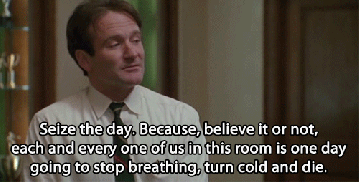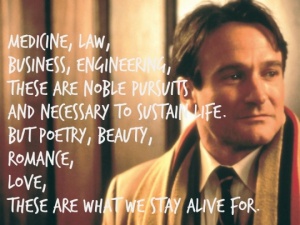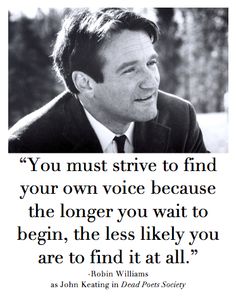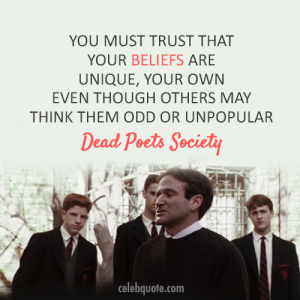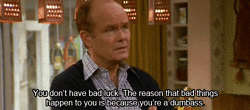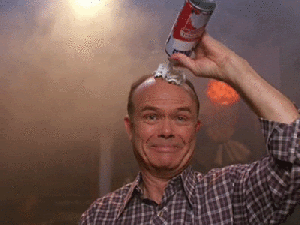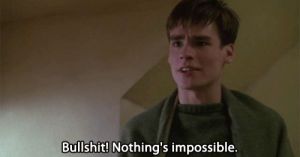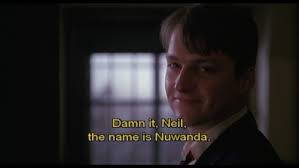For my final project we had to review something twenty years or older and critic it from a present cultural perspective. Automatically, my mind went straight to film. Movies are the only widely accepted form of “new media” that is art that is also widely consumed. Film, when done correctly, are a beautiful coupling of writing and cinematography. But there is something inherently human about movies that speaks to us. I wanted to chose something that was still widely viewed as great, but also I had never seen before. I narrowed it down to a few finalists and came to the decision of Peter Weir’s 1989 classic, “Dead Poets Society.” And I know what you’re thinking, how the hell have I not seen “Dead Poets Society?” Especially since one of my favorite films of all time is the Peter Wier’s “The Truman Show,” popularized nearly a decade later.
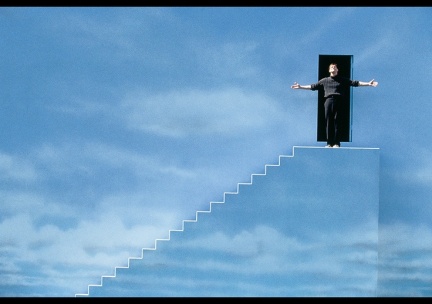
And although “The Truman Show” is still my favorite of the two,
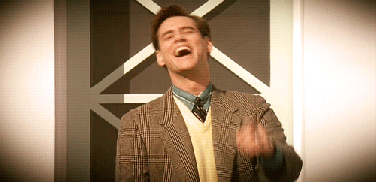
(Much to Jim Carey’s delight) I found myself with a new favorite film that I couldn’t wait to tell people about. I’ve always hated it when someone realizes you haven’t seen their favorite movie, and they urge you to go see it not only because it’s a good movie, but because they somehow identify with that movie and want you to understand them on a deeper level. It’s like homework for real life. Within the last few months is has been circulating that the “Dead Poets Society” will be made into an off Broadway play. By my estimation this is the smallest bit of proof that proves that the “Dead Poets Society” has moved from the category of movie to film. And that distinction couldn’t be farther apart. There are books and their is literature. There are movies abd their is cinema. And for the latter is where we get our American canon, our cultural master pieces that transcend time. And after about a year and half since his death, I have abstained from enjoying Robin Williams’ work, because the wound of losing his greatness was too raw. That being said, I knew that I hadn’t seen a lot of his best work, so now I can really get an idea of what we lost with his passing.
In that way we still have Robin and we can still gain wisdom through a number of his memorable roles.
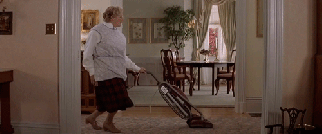
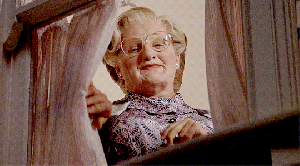
But there are several moments where John Keeting possesses the audience’s heart and we are powerless as we are left captivated and inspired. There are so many moments in this movie that I could write 1,000 words on one of these life lessons that Keeting provides. Because I clearly can’t do that, I will leave you with some of these moments.
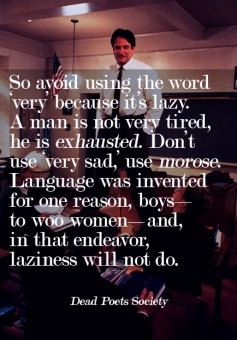
Robin Williams’ performance as John Keeting is enough to love the movie, and it’s one of the biggest reasons, but everyone knows that already. Robin Williams might be one of the greatest when it came to inspiring an audience and eliciting emotion through film. But going into a Robin Williams movie blind like I did might be the only reason you stick around. This was not that kind of movie. I appreciated Peter Weir’s choice to focus of the boys more that Mr. Keeting. Although, John Keeting acts as the driving force behind much of the plot progression throughout the film, there are several characters that are developed well enough for the audience to connect with and carry beyond the movie. Let me start with saying of how excited I was that Kurtwood Smith played the authoritative dad, a role which Red Forman from “That 70’s Show” is likely based.
There are many similarities between the two characters, but they are not the same. Both come from tough upbringings and believe that they are where they are today because they had it tough growing up. Although we see little change in Mr. Perry’s character, Red Forman’s character has a nobler cause and has more room to admit mistakes.
I thought that we may see a little change in Mr. Perry when he came to see Neil perform, but when it was clear that Mr. Perry wouldn’t budge from his position I knew the result would be devastating. I felt connected with Neil’s character, because I find myself having the same problems with a lack of purpose that Neil had. I understand that some critics may argue that Neil’s character is created to have a wide appeal over a vast audience, but I feel that he overcame that critic because he was so human.
And with many of us struggling for purpose in this world, and therefore we can connect with Neil’s character. I don’t know that everyone can connect with Neil’s decision to take his life, because we realize the charisma, charm, and pure potential Neil Perry had. With that said, I am one person that understands Neil’s decision and I don’t fault the writers for this resolution because I was satisfied with the progression they laid out. And in most cases, I find myself having a hard time siding with people who chose to commit suicide, as I have dealt with depression most of my life, but in this case the writers and Robert Sean Leonard’s performance forced me to side with Neil Perry.

Another character I found myself connected with was Knox Overstreet, who for most of the film finds himself head over heels (for a girl he barely knows, but she’s beautiful so it’s okay). Although this is a rather tired story line in movies, I found myself liking Knox’s character despite how archaic this story line is. Knox represents all male teenage naivete and angst, and whether we’d all like to admit it or not, we were there once, and we support Knox’s pursuit, regardless of how foolish we know him to be.
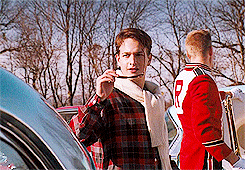
Charlie Dalton’s character on the other hand, is the guy we always wanted to be, but we never were. Charlie was the strong, confident and rebellious voice that the Dead Poets Society needed more of if you ask me. 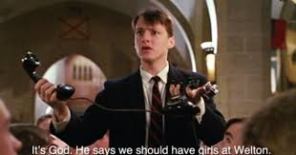
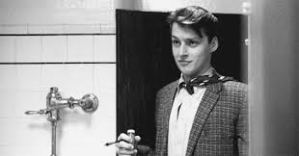
To be honest, Todd Anderson’s character was a limited compared to some of the other great characters that I’ve previously mentioned. And I think that’s no fault to Ethan Hawke, who credits this role as his path into acting. But Todd Anderson’s character is so vanilla and slowly developed that at when the credits roll we feel like we’ve just met Todd. Maybe that’s the sort of resolution that the writers wanted, but in my eyes they could have built some more moments to focus on Todd’s transformation so that the audience could truly extrapolate the future that we’re supposed to believe Todd has in store.
Overall, I believe that “Dead Poets Society” is one of Robin Williams’ greatest performances, and there are several characters that are well developed with a fantastic plot to boot.

